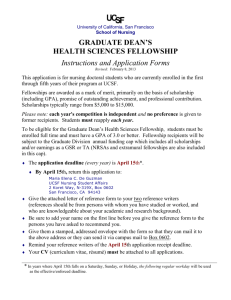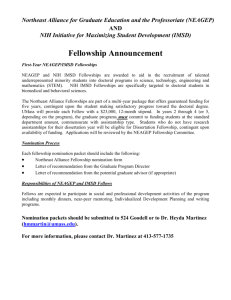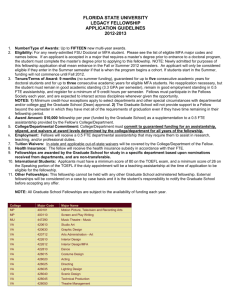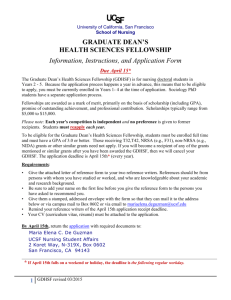outline and resources for a professional development website for
advertisement
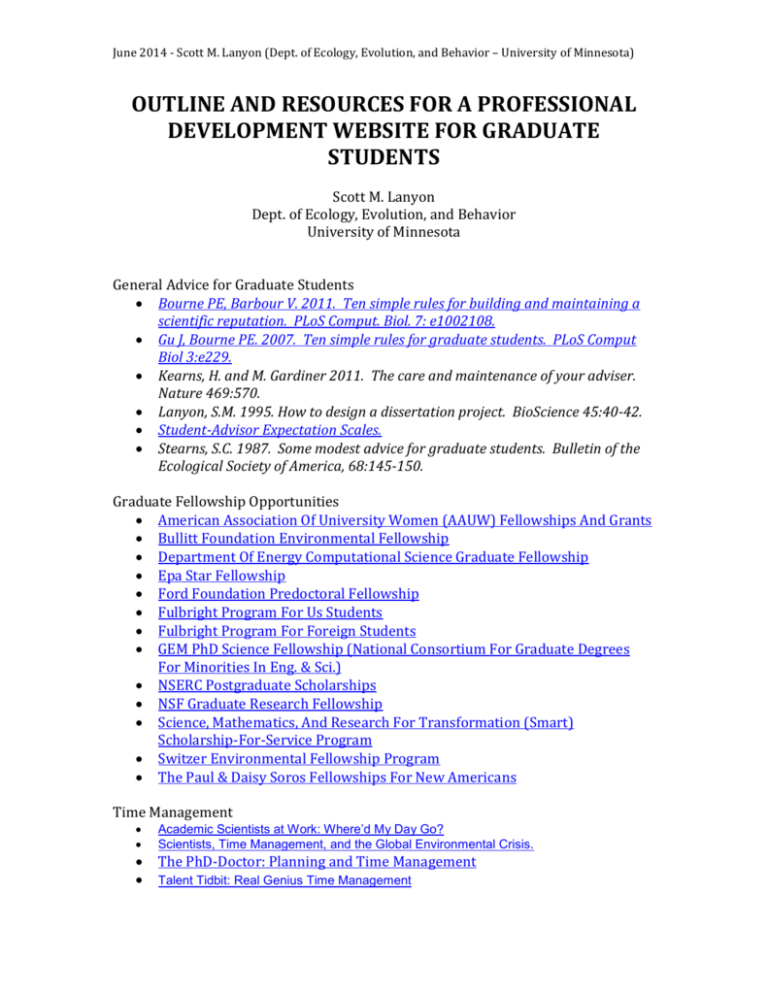
June 2014 - Scott M. Lanyon (Dept. of Ecology, Evolution, and Behavior – University of Minnesota) OUTLINE AND RESOURCES FOR A PROFESSIONAL DEVELOPMENT WEBSITE FOR GRADUATE STUDENTS Scott M. Lanyon Dept. of Ecology, Evolution, and Behavior University of Minnesota General Advice for Graduate Students Bourne PE, Barbour V. 2011. Ten simple rules for building and maintaining a scientific reputation. PLoS Comput. Biol. 7: e1002108. Gu J, Bourne PE. 2007. Ten simple rules for graduate students. PLoS Comput Biol 3:e229. Kearns, H. and M. Gardiner 2011. The care and maintenance of your adviser. Nature 469:570. Lanyon, S.M. 1995. How to design a dissertation project. BioScience 45:40-42. Student-Advisor Expectation Scales. Stearns, S.C. 1987. Some modest advice for graduate students. Bulletin of the Ecological Society of America, 68:145-150. Graduate Fellowship Opportunities American Association Of University Women (AAUW) Fellowships And Grants Bullitt Foundation Environmental Fellowship Department Of Energy Computational Science Graduate Fellowship Epa Star Fellowship Ford Foundation Predoctoral Fellowship Fulbright Program For Us Students Fulbright Program For Foreign Students GEM PhD Science Fellowship (National Consortium For Graduate Degrees For Minorities In Eng. & Sci.) NSERC Postgraduate Scholarships NSF Graduate Research Fellowship Science, Mathematics, And Research For Transformation (Smart) Scholarship-For-Service Program Switzer Environmental Fellowship Program The Paul & Daisy Soros Fellowships For New Americans Time Management Academic Scientists at Work: Where’d My Day Go? Scientists, Time Management, and the Global Environmental Crisis. The PhD-Doctor: Planning and Time Management Talent Tidbit: Real Genius Time Management June 2014 - Scott M. Lanyon (Dept. of Ecology, Evolution, and Behavior – University of Minnesota) Ethics Honor in Science Diversity = Productivity The Responsible Researcher Gender, Race, and Families Issues in Academia Do Babies Matter? – The Effect of Family Formation on Lifelong Academic Careers of Men and Women From Doctorate to Dean or Director: Sustaining Women through Critical Transition Points in Science, Engineering, and Medicine Too Nice to Land a Job Exploring the color of glass: letters of recommendation for female and male medical faculty The Impact of Gender on the Review of the Curricula Vitae of Job Applicants and Tenure Candidates: A National Empirical Study Are Emily and Greg More Employable Than Lakisha and Jamal? A Field Experiment on Labor Market Discrimination What We Know Now About Bias and Intergroup Conflict, the Problem of the Century Reducing the Effects of Gender Stereotypes on Performance Evaluations The Impact of Gender on the Review of the Curricula Vitae of Job Applicants and Tenure Candidates: A National Empirical Study The Awesomest 7-Year Postdoc or: How I learned to stop worrying and love the tenure-track faculty life. Don’t be that dude: Handy tips for the male academic Broader Impacts Communicating Science: A Primer for Working with the Media. AIBS Publication Broader Impacts 2.0: Seeing—and Seizing—the Opportunity Science: For Science’s or Society’s Sake? Amplify the signal: Graduate training in broader impacts of scientific research Scientific Creativity A student’s guide to research Strong Inference A guide to increased creativity in research – inspiration or perspiration? The increasing dominance of teams in production of knowledge The importance of stupidity in scientific research June 2014 - Scott M. Lanyon (Dept. of Ecology, Evolution, and Behavior – University of Minnesota) Scientific Writing Books on Scientific Writing Day, Robert A. and Barbara Gastel 2011. How to Write & Publish a Scientific Paper Hofmann, Angelika H. 2010. Scientific Writing and Communication. Knisely, Karin 2009. A student handbook for writing in biology Matthews, Janice R. 2008. Successful Scientific Writing: A step-by-step guide for the biological and medical sciences. McMillan, Vicky 2001. Writing papers in the biological sciences Pechenik, Jan A. 2009. A short guide to writing about biology Rabinowitz, Harold 2009. The Manual of Scientific Style Scientific Style and Format: The Council of Biological Editors Manual for Authors, Editors, and Publishers 1978 Author Sequence and Credit for Contributions in Multiauthored Publications Authorship in ecology: attribution, accountability, and responsibility Authorship Guidelines Does it pay to have a “bigwig” as a co-author? Writing with precision, clarity, and economy Judging the quality of our research: a self-assessment test Concept Maps Visual Understanding Environment FreeMind Teaching Leading an Effective Discussion Leading Scintillating, Stimulating, Substantive Class Discussions Student Reviews of Scientific Literature: Opportunities to Improve Students' Scientific Literacy and Writing Skills Making the most of your teaching assistantship experience How to get all-important teaching experience Teaching critical thinking: Some lessons from cognitive science Critical thinking skills in education and life Ten Simple Rules To Combine Teaching and Research Advising and Mentoring The Mentor: An academic advising journal How to mentor graduate students Nature’s guide for mentors June 2014 - Scott M. Lanyon (Dept. of Ecology, Evolution, and Behavior – University of Minnesota) How to Review Scientific Papers BRINGING UP SCIENTISTS IN THE ART OF CRITIQUING RESEARCH A Systematic Guide to Reviewing a Manuscript Manuscript peer review: A helpful checklist for students and novice referees Article Critique Checklist How to Give a Scientific Presentation/Poster Susan McConnell – Designing Effective Scientific Presentations: Using PowerPiont and Structuring Your Talk When the Scientist Presents: Resources for the presenter scientist Dazzle ‘em with Style Ten secrets to giving a good scientific talk A periodic table of visualization methods Meeting Manners: Unspoken rules of polite meeting attendance and presentation Things that can go wrong with PowerPoint presentations Career Preparation Applying for Jobs Interviewing for Jobs Feel free to email me (lanyo001@umn.edu) with suggestions of additional online resources that would be of general interest.

